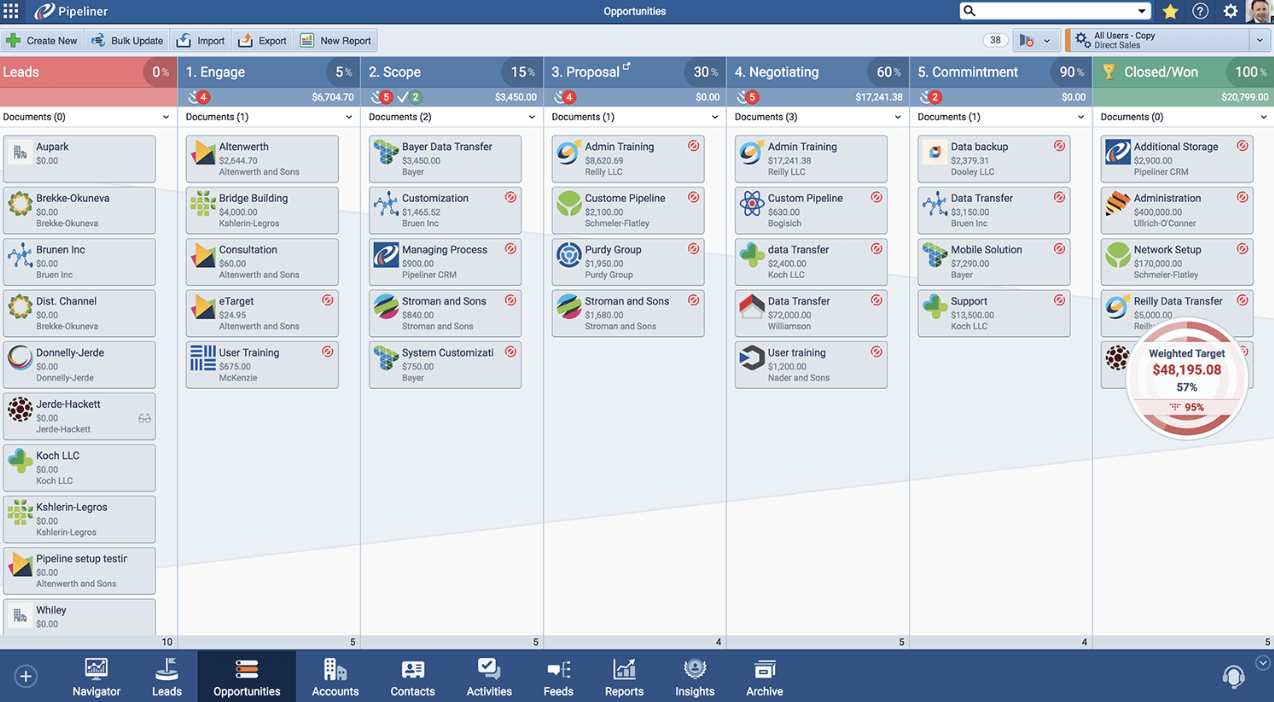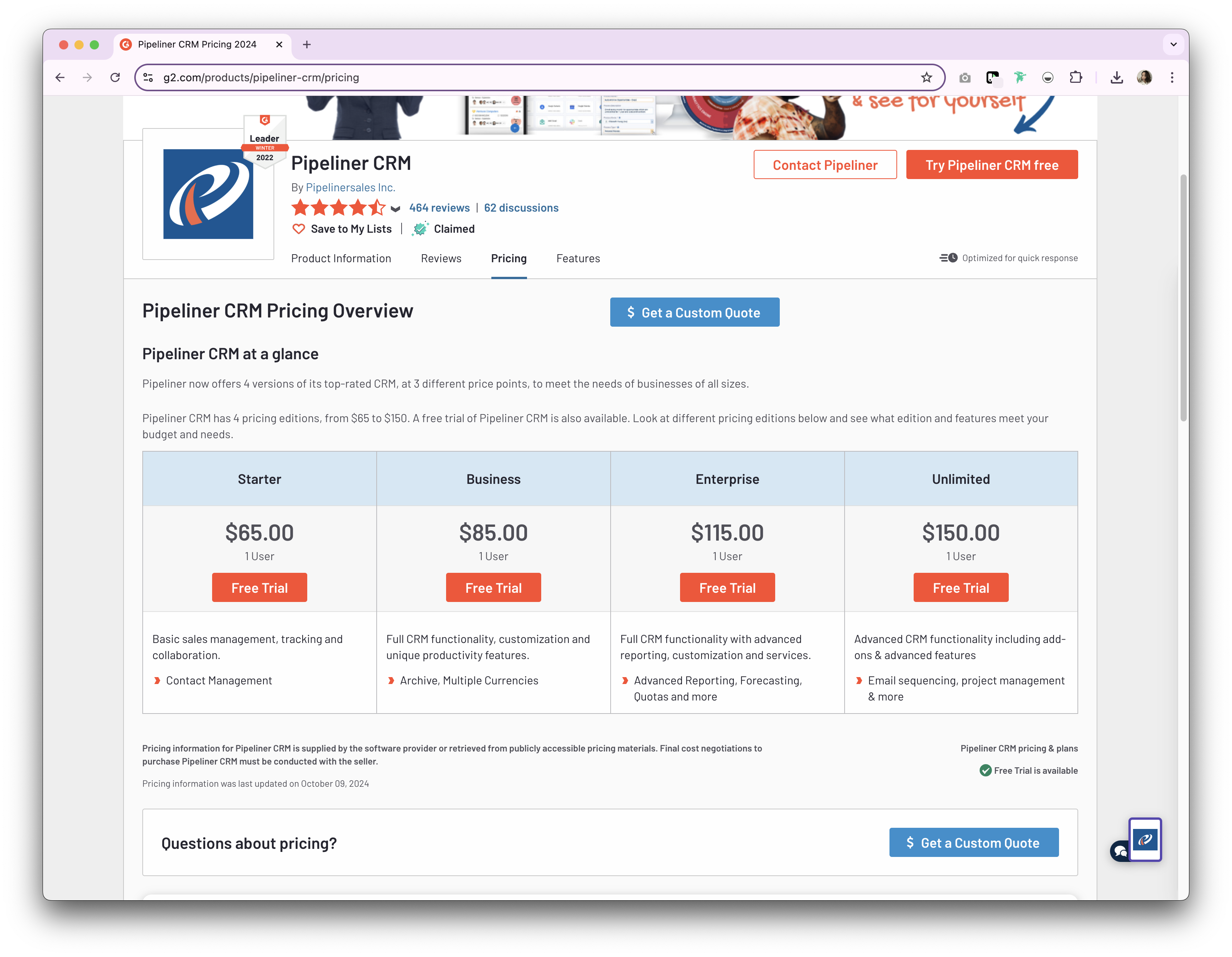Discover folk - the CRM for people-powered businesses
Zoho CRM vs. Pipeliner CRM at a glance
On the market for a new CRM system? Zoho CRM and Pipeliner CRM are two platforms designed to help businesses manage customer relationships and sales processes effectively.
Zoho CRM offers a comprehensive suite of tools, including automation, AI-driven insights, and integrations, making it suitable for businesses seeking an all-in-one solution. Pipeliner CRM, on the other hand, focuses on visual pipeline management and in-depth analytics, catering to teams that prioritize detailed sales tracking.
In this blog post, we'll explore their features, pricing, and usability to help you choose the right fit. We'll also introduce folk – the most popular CRM alternative specifically designed for sales teams of 20-50 people seeking a versatile solution.
👉🏼 Try folk now to compare folk against Zoho and Pipeliner and see how it simplifies pipeline management for 20–50 person sales teams
| Main points |
|---|
|
What is Zoho?
Zoho is a CRM system with a strong sales focus. It has journey orchestration, sales process management, and workflow automation features. There's also something for marketing teams, including event management and customer segmentation.
Key features of Zoho
- Sales automation: Automates sales tasks like lead management, deal tracking, and follow-up actions.
- Customizable dashboards and reports: Allows users to create and customize dashboards and reports for in-depth analytics.
- Multi-channel communication: Integrates with email, phone, social media, and live chat to manage customer interactions.
- Lead and contact management: Manages customer information, tracks interactions, and segments contacts for targeted campaigns.
- Workflow automation: Automates routine tasks and processes to improve efficiency and reduce manual effort.
- AI-powered sales assistant (Zia): Provides predictive analytics, task automation, and intelligent suggestions to enhance sales performance.
What is Pipeliner CRM?
Pipeliner is an AI-powered sales CRMNAME designed for small, mid-sized, and enterprise organizations, focusing on simplicity and scalability. It offers a visual approach to sales management, allowing teams to track pipelines, forecast outcomes, and automate workflows.
Key features of Pipeliner CRM
- Sales force automation: Automates routine sales tasks, helping teams focus on selling while ensuring consistency across workflows.
- Key account management: Provides tools to manage and track relationships with high-value clients, ensuring personalized attention and strategy.
- Communications and activities tracking: Logs and organizes all interactions, calls, and emails, providing a centralized view of customer communication.
- Reporting engine: Offers customizable reports and dashboards to deliver insights into sales performance and team productivity.
- Process and workflow automation: Automates repetitive workflows, such as task assignments and approvals, to improve efficiency and reduce manual effort.
Zoho vs. Pipeliner CRM: Feature Comparison
Let's break down the key features of two CRM software solutions and take a closer look at their sales automation, email marketing tools, and contact management.
1. Sales Pipeline Management
Zoho CRM's pipeline management feature provides a visual overview of the sales process, allowing users to track deals at various stages and manage the flow of opportunities effectively. Pipeliner CRM's pipeline feature offers a visual interface to track sales opportunities through different stages. It supports multiple pipelines to accommodate different sales workflows, with integrated tools like automation and reporting to assist with task management and deal prioritization. While both platforms offer solid pipeline management features, sales teams of 20-50 people often find these solutions either too complex or lacking the flexibility needed for their specific sales processes.


2. Ease of use
Zoho CRM is known for its intuitive interface, making it user-friendly for businesses of all sizes. Pipeliner CRM also offers an easy-to-navigate design, but some users may find its extensive customization options a bit overwhelming initially. Both platforms provide comprehensive onboarding resources to assist new users.
3. Contact enrichment
Zoho CRM's contact enrichment feature, powered by its AI assistant Zia, automatically updates and enriches records using data from various online sources. The feature can fill in missing details, such as email addresses, phone numbers, company information, and social media profiles. Pipeliner CRM offers a contact enrichment feature through its Auto Profiling integration, which automatically populates additional data for contacts and accounts. The Auto Profiling integration is an add-on and must be activated through the Pipeliner Automation Hub, making it a more selective and optional tool for contact enrichment.
4. Outreach
Zoho CRM supports multichannel outreach, enabling businesses to connect with leads through email, social media, and other platforms, while automating workflows like lead assignment. Pipeliner CRM includes basic outreach capabilities with its mass email feature, allowing users to send bulk emails and track engagement metrics, but it may require additional tools for comprehensive outreach.
5. Automation
Zoho CRM provides comprehensive automation features, including workflow automation, Blueprint for sales processes, and Zia AI for predictive automation. Pipeliner CRM offers workflow automation for tasks like assignments and follow-ups, with integration options for enhanced functionality, though advanced setups may need additional configuration.
6. Integration
Zoho integrates with a wide range of third-party applications to expand its functionality, including popular tools like Google Workspace and Microsoft Office. It also connects with accounting software such as QuickBooks and more. Pipeliner CRM integrates with over 50 popular applications, including Google Suite, Microsoft Suite, and various marketing, email, and data synchronization tools, to streamline workflows and enhance productivity.
7. Artificial Intelligence
Zoho CRM integrates AI through its assistant, Zia, which enhances productivity by automating tasks like data entry and lead prediction. Pipeliner CRM's Voyager AI Gen provides data-driven insights to enhance sales decision-making, focusing on sales insights and recommendations to streamline the sales process.
Price and plans comparison
Let's take a closer look at the price and plans of both Zoho and Pipeliner CRM.
Zoho prices
Zoho offers a free plan limited to three users. After that, an annual subscription plan is as follows.
- Standard: $14 per user, per month.
- Professional: $23 per user, per month.
- Enterprise: $40 per user, per month.
- Ultimate: $52 per user, per month.

Pipeliner CRM prices
Pipeliner provides a few options for you to choose from depending on the features, and price point you're after.
- Starter: Starts from $65/seat/month.
- Business: Starts from $85/seat/month.
- Enterprise: Starts from $115/seat/month.
- Unlimited: Starts from $150/seat/month.

Introducing folk CRM: the best alternative to Zoho and Pipeliner CRM
Looking for an affordable alternative specifically designed for medium-sized sales teams? We recommend folk. A multiple award-winning CRM platform loved for its easy-to-use, plug-and-play CRM system that's perfectly tailored for sales teams of 20-50 people. folk can support multi-use cases across sales, marketing, recruitment, and more. Unlike Zoho and Pipeliner, folk CRM is built specifically to handle the unique needs of medium-sized sales teams, offering the perfect balance of features and simplicity without overwhelming smaller teams or underserving larger ones.
👉🏼 Try folk now to migrate your contacts and automate follow-ups so your team never misses a deal in the Zoho vs Pipeliner comparison

.png)
.png)
Key features
- Contact management: Bring all your contacts into one place seamlessly, from social media platforms such as LinkedIn, Instagram and X to multiple inboxes including Gmail and Outlook.
- Notes and reminders: Attach notes directly to a contact's profile in folk, and access them on the go. And assign reminders so you know exactly when to follow-up.
- Sales pipeline dashboard: Manage your entire sales cycle and leads with a highly customizable sales pipeline dashboard that can be used in Kanban-board view or listicle.
- Ease of use and customization: Easily customize the pipelines, dashboards, automation, email sequences, so that you can use it across your sales cycle and pipeline management – and other business functions such as recruitment, marketing, and more.
- Social media integration: Import people and companies from LinkedIn, Sales Navigator, Instagram, and X within a click thanks to folk's Google Chrome extension.
- Contact sync from Gmail and Outlook: Full email sync enabling users to manage all communications directly from the CRM.
- Find email addresses in a click: Contact enrichment powered by Apollo, and Dropcontact so you can fill in missing data points with 1-click.
- Email sequences: Send email sequences with reminders if your leads don't reply to your first emails. It includes an AI integration allowing you to personalize email at scale.
Price and plans
folk has a 14-day free trial. After that, there are affordable monthly or annual subscription plans. The annual subscription plan is as follows.
- Standard: $20 per user, per month.
- Premium: $40 per user, per month.
- Custom: Starts from $80 per user, per month.

Zoho vs. Pipeliner CRM: What's the Verdict?
In comparing Zoho and Pipeliner CRM, it's clear how both platforms offer robust features designed to enhance sales processes and customer relationship management. Zoho stands out with its extensive customization options and affordability, making it ideal for small to medium businesses. Pipeliner CRM excels with its visual sales management tools and scalability, catering well to larger organizations. However, for medium-sized sales teams of 20-50 people specifically evaluating these CRM options, folk offers the most tailored solution, combining ease of use with the exact level of customization capabilities your team size needs. Try folk today, to experience the best CRM solution designed specifically for sales teams like yours.
FAQ
What is Pipeliner CRM used for?
Pipeliner CRM supports visual pipeline management, deal tracking, forecasting, and workflow automation. It helps sales teams manage accounts, activities, and reports with customizable dashboards and multiple pipelines.
Is Zoho CRM good for small and medium businesses?
Yes. Zoho CRM offers affordable tiers, sales automation, customizable dashboards, and Zia AI. It suits SMBs needing an all-in-one CRM, though advanced setups may feel complex without careful configuration.
How do Zoho CRM and Pipeliner CRM pricing compare?
Zoho: free for 3 users, then $14–$52/user/month (annual billing). Pipeliner: $65–$150/seat/month. Zoho is cheaper, while Pipeliner targets teams needing advanced visual sales features.
What is a good alternative to Zoho and Pipeliner for 20-50 person teams?
A strong alternative is folk: a simple, customizable CRM with pipelines, contact enrichment, and email sequences. Annual pricing: Standard $20/user/month, Premium $40, Custom from $80. 14-day free trial.
Discover folk CRM
Like the sales assistant your team never had


